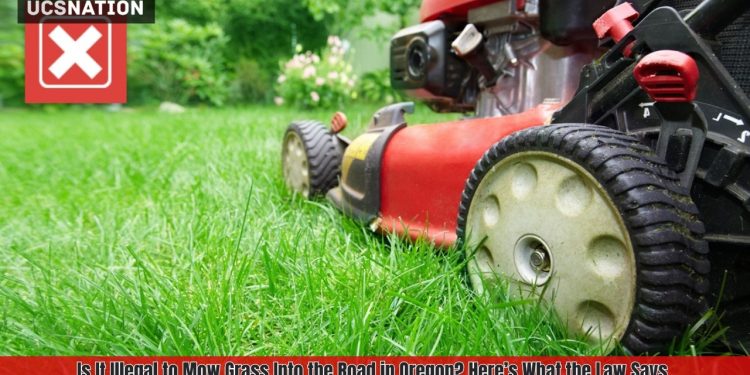When the sun is shining and the grass is growing, many Oregon homeowners take pride in maintaining a tidy lawn. Mowing the lawn is a routine chore, but what happens to the grass clippings? It might seem convenient to simply blow or mow them directly into the street, especially if you’re in a hurry or trying to avoid bagging. However, this common practice raises an important question: Is it illegal to mow grass into the road in Oregon?
The short answer is yes. In Oregon, it is generally illegal to deposit grass clippings, leaves, or other yard debris onto public roadways. While it may appear harmless, doing so can pose serious risks to public safety, environmental health, and infrastructure. Understanding the legal framework, potential consequences, and responsible alternatives is essential for every property owner in the state.
Understanding Oregon’s Littering and Debris Laws
Oregon has clear regulations regarding the disposal of waste materials, including organic debris like grass clippings. The state’s litter laws are designed to protect roadways, waterways, and public spaces from pollution and hazards. Under Oregon Revised Statutes, specifically those addressing littering and unlawful dumping, it is prohibited to discard any refuse on public or private property without permission.
Grass clippings blown into the road are considered a form of litter or debris. Even though they are biodegradable, they are not exempt from these regulations. When clippings accumulate on pavement, they can create slippery conditions, block storm drains, and contribute to water pollution. As a result, local municipalities and the Oregon Department of Transportation (ODOT) enforce rules that prohibit this practice.
Why Grass Clippings on Roads Are a Problem
At first glance, grass clippings might seem innocuous. However, their presence on roadways can lead to several significant issues:
Safety Hazards Wet grass clippings are extremely slippery, creating dangerous conditions for motorists, cyclists, and pedestrians. A layer of clippings can reduce traction, increasing the risk of accidents, especially on curves or during rainy weather. Motorcycles and bicycles are particularly vulnerable to losing control on slick surfaces. In fact, debris-related accidents are a documented concern for transportation authorities.
Environmental Impact Oregon is known for its commitment to environmental conservation. Grass clippings that wash into storm drains eventually enter local waterways, contributing to nutrient pollution. As clippings decompose, they release nitrogen and phosphorus into rivers, lakes, and streams. This can lead to algal blooms, which deplete oxygen levels and harm aquatic ecosystems. In some cases, excessive nutrients can even affect drinking water quality.
Infrastructure Issues Clogged storm drains are a common consequence of grass clippings in the road. When drains are blocked, rainwater cannot properly flow away, leading to street flooding during heavy rains. This not only inconveniences residents but also strains municipal resources. Public works departments must allocate time and money to clear drains and repair water damage caused by debris blockages.
Legal and Financial Consequences Violating Oregon’s litter laws can result in fines. While enforcement may vary by jurisdiction, individuals caught mowing grass into the road could face penalties. In some areas, residents may also be held responsible for cleanup costs if their actions contribute to drainage issues or accidents.
What Oregon Law Specifically Says
While Oregon state law does not have a statute that explicitly mentions “grass clippings,” several broader regulations apply. For example, ORS 164.775 defines littering as throwing, depositing, or dumping any rubbish, refuse, or waste material on public or private property. Grass clippings fall under this category when intentionally directed onto roadways.
Additionally, many cities and counties in Oregon have their own ordinances that address yard waste disposal. For instance, the City of Portland’s code prohibits placing any material in a street or sidewalk that may obstruct traffic or cause a nuisance. Eugene, Salem, and Bend have similar rules, often emphasizing the importance of keeping storm drains clear.
The Oregon Department of Transportation also has guidelines for maintaining vegetation along state highways, emphasizing that clippings and trimmings must not be left on roadways. Property owners adjacent to state highways are expected to manage their landscaping in a way that does not compromise road safety.
Responsible Lawn Care Practices in Oregon
Given the legal and environmental implications, Oregon residents should adopt responsible lawn care habits. Here are some best practices for handling grass clippings:
Leave Clippings on the Lawn One of the simplest and most eco-friendly options is to use a mulching mower. Mulched clippings break down quickly, returning valuable nutrients to the soil and reducing the need for fertilizer. This method saves time, enriches your lawn, and eliminates the need to dispose of clippings.
Composting If you prefer to collect clippings, consider composting them. Grass clippings are an excellent source of green material for compost piles. When combined with brown materials like leaves or straw, they decompose into rich, organic compost that can be used to improve garden soil.
Curbside Yard Waste Collection Many Oregon communities offer curbside yard waste collection services. Residents can place grass clippings, leaves, and other organic debris in designated bins or bags for pickup. These materials are then composted or processed at facilities, keeping them out of landfills and roadways.
Disposal at Designated Facilities For those with large amounts of yard waste, local transfer stations and recycling centers often accept grass clippings. Some municipalities even host seasonal drop-off events for organic materials.
Avoid Blowing Clippings into Streets When using a leaf blower or lawn mower, direct clippings away from paved surfaces. Aim discharge chutes toward your lawn or garden beds. If clippings accidentally end up on the road, sweep or blow them back onto your property promptly.
The Bigger Picture: Community and Environmental Stewardship
Oregon’s natural beauty is one of its greatest assets, and preserving it requires collective effort. By responsibly managing grass clippings, homeowners contribute to safer roads, healthier waterways, and more sustainable communities. Simple actions, such as proper yard waste disposal, reflect a broader commitment to environmental stewardship.
Local governments and organizations often provide educational resources on eco-friendly landscaping. Programs like the Oregon State University Extension Service offer guidance on sustainable lawn care, including tips for reducing waste and protecting natural resources.
Conclusion
Mowing grass into the road is not only ill-advised—it is illegal in Oregon. State and local laws prohibit depositing yard debris on roadways due to the safety, environmental, and infrastructural risks involved. Responsible alternatives, such as mulching, composting, or using curbside collection services, are easy to implement and benefit both your property and the community.
By understanding and adhering to these regulations, Oregon residents can help maintain the state’s reputation for cleanliness, safety, and environmental consciousness. So the next time you mow your lawn, remember: keeping clippings on your property isn’t just a good practice—it’s the law.









